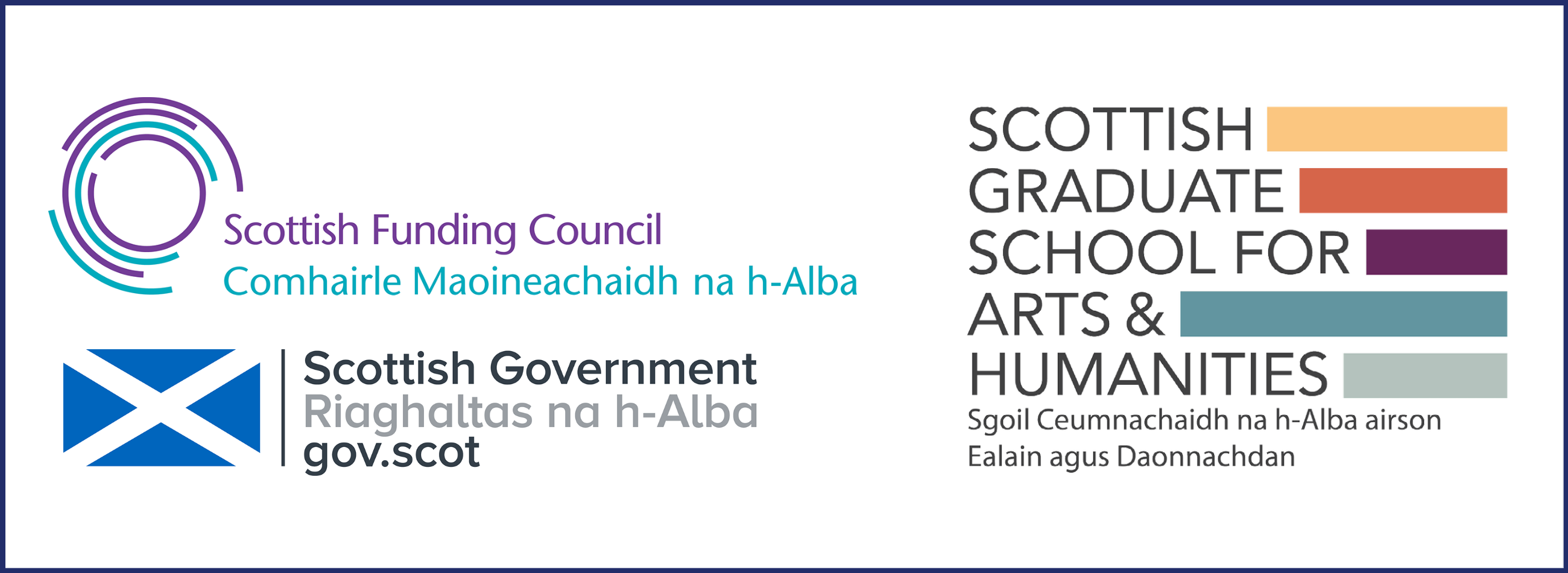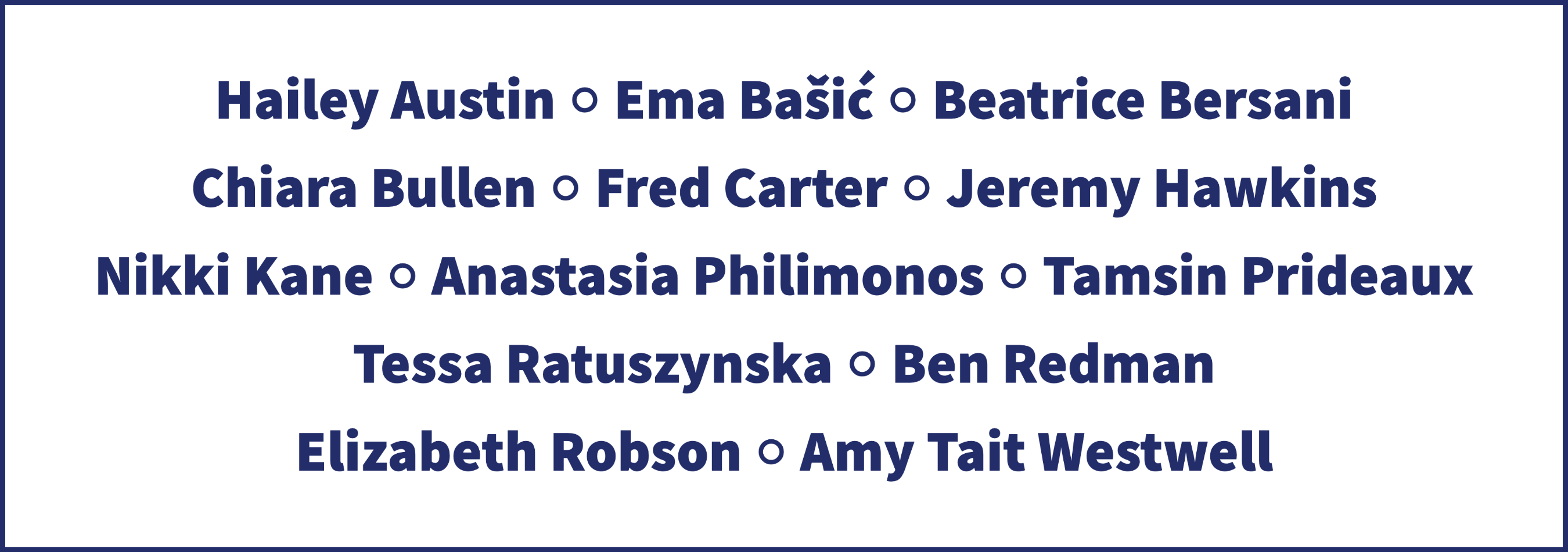Announcing the SGSAH SFC Saltire Cohort 2022
Published: 13 January 2022
The SFC Saltire Emerging Researcher Scheme for the Arts & Humanities is a programme run by SGSAH with funding from the Scottish Funding Council (SFC) to enable research collaborations between Scotland and Europe. The programme launched in October 2021 and proposals were considered by an assessment panel in December 2021. Thirteen outstanding researchers from eight HEIs have been selected. Read more.
Issue date: 13/01/2022

The SFC Saltire Emerging Researcher Scheme for the Arts & Humanities is a programme run by SGSAH with funding from the Scottish Funding Council (SFC) to enable research collaborations between Scotland and Europe. The programme aims to promote mobility between Scottish and European research partners in order to strengthen existing, and seed future, research relationships. PhD and Early Career Researchers from SGSAH member HEIs were invited to apply, alongside PhD researchers and ECRs from an EU, EEA or EFTA HEI.
Members of the scheme will undertake a research exchange of up to six months between January and August 2022. They will also participate in a cohort development programme to nurture PhD and ECR perspectives, skills and qualities. Exchange researchers will additionally have the opportunity to showcase their work through SGSAH’s online research showcase, and take part in the 2022 SGSAH International Summer School. The Programme is structured around SGSAH’s Strategic Themes and Priority Areas.
The programme launched in October 2021 and proposals were considered by an assessment panel in December 2021. Thirteen outstanding researchers from eight HEIs have been selected. The exchanges include researchers going from the University of the West of Scotland to Malmö University (Sweden), from the University of Edinburgh to the Amsterdam School for Cultural Analysis (the Netherlands), and from the University of Zadar (Croatia) to the University of Glasgow. The projects that will be undertaken by the researchers include investigations of the role heritage plays in society and the methods used for understanding and reflecting this role in heritage management; of exchanges of ideas about political tactics and collectives between underrepresented people in Scotland and Ireland in the late 18th and early 19th centuries; and new methods of music teaching and learning afforded by low-latency technologies.
Meet our SFC Saltire Emerging Researchers

Hailey Austin
HEI: University of Dundee
Exchange Host: Stockholm University, Sweden
In her collaboration with Stockholm University, Hailey will continue her PhD research in comics as well as her AHRC funded research at Abertay University’s InGAME International project assessing UK/China Creative Industries. In Stockholm, the creative industries are female-lead and female-centred. Dr Austin will lead ethnographic research at Star Stables, the leading girls’ browser videogame for 10 years, as well as the larger Stockholm comics community. While there, she will participate in game research seminars and host an international Women in Games event. Her findings will detail what the UK can learn from Stockholm’s female-forward creative industries model.
Ema Bašić
HEI: University of Zadar, Croatia
Exchange Host: University of Glasgow
Cultural and creative industries (CCIs) are being recognized for their rising importance not only in urban, but in rural areas. However, the lack of digital and cultural infrastructure in rural spaces often leads to a discussion of how ‘creative’ the countryside economy really is. In this project, the expertise of the University of Glasgow’s arts and cultural research on CCIs in Scotland’s rural areas will be used to support Ema’s PhD research on CCI development in Croatia’s rural region of Lika. Such expertise is lacking in Croatian academia. This project will address this by building new knowledge, research skills and networks.
Beatrice Bersani
HEI: University of Edinburgh
Exchange Host: University of Toulouse-Jean Jaurès, France
Fourth-century Latin poetry represents gods as light and colour. Beatrice’s PhD project explores such imagery to understand the differences and integrations between traditional polytheistic culture and new Christian monotheism. For a month, she will join the ERC-funded project 'Mapping Ancient Polytheisms’, which analyses divine names to investigate how Mediterranean cultures conceived divine forces. Her aim is to assess whether colour/light effects form a system that makes conceivable the structures of polytheistic mentality. The research will benefit from MAP’s expertise in religious colour symbology, and from the innovative research tools (web-mapping and network analytics) developed by its team.
Chiara Bullen
HEI: University of Stirling
Exchange Host: University of Münster, Germany
Chiara will participate in a three-month exchange with the University of Münster's Book Studies department and the DFG-funded collaborative Law and Literature research centre. She will contribute to the "Literature and the Market" sub-project, exploring the relationship between law and literature and its impact on society and culture. Proposed project outputs also include organising "Law and Literature" events and establishing a network between the Book Studies departments at the University of Stirling and Münster. Chiara will also continue working on her PhD research across publishing studies, literature and law.
Fred Carter
HEI: University of Edinburgh
Exchange Host: Amsterdam School for Cultural Analysis (ASCA), Netherlands
Fred will spend six months as a guest researcher at the University of Amsterdam working with Jeff Diamanti to establish FieldArts, an interdisciplinary residency for early career researchers, artists, and writers working with field-based practices in the environmental humanities. Building on the SGSAH-funded project FIELDWORK, FieldArts draws together a programme exploring the brackish waters of the Ij River as an estuarine site shaped by the alluvial sediment of colonial expropriation, capital accumulation, and extractive logistics in order to address an emerging epistemic challenge: how do environmental researchers and artists respond to and learn with the historical, ecological, and material relations of ‘the field’ in their thinking, writing, and practice?
Jeremy Hawkins
HEI: University of Glasgow
Exchange Host: Delft University of Technology, Netherlands
Jeremy’s doctoral thesis maps a field of action for situated writing practices as a means of knowledge production in spatial design contexts. His project studies how creative writing strategies operate in the acquisition and construction of new qualitative spatial knowledge, while also performing a reflexive critique of how spatial design contexts impact writing practices themselves. He will be working with members of the Chair of Analysis and Imagination at TU Delft to study literary design methods in architecture and urbanism. He will also join the EU-funded COST Action 18126 Writing Urban Places, piloted by researchers in Delft.
Nikki Kane
HEI: University of Edinburgh
Exchange Host: University of Bergen, Norway
Nikki Kane, PhD candidate in History of Art at the University of Edinburgh and Lecturer in New Media Art at the University of the West of Scotland will take part in a research exchange with the Faculty of Fine Art, Music and Design at the University of Bergen. Here, she will develop research into artist-run initiatives and self-organised artistic activity. This project will foster important knowledge exchange between Scotland and Norway. It will also explore these so-far under-researched practices in relation to changing conceptions on cultural work, national and local cultural policy, and models of curatorial experimentation.
Anastasia Philimonos
HEI: University of Edinburgh
Exchange Host: Karlsruhe University of Arts & Design, Germany
Anastasia Philimonos, PhD candidate in History of Art, will undertake a three-month exchange at Karlsruhe University of Art and Design, Germany, and its partner institution, the Centre for Art and Media Karlsruhe (ZKM). Throughout the duration of the exchange, Anastasia will be based in Karlsruhe where she will join the practice-based research project ‘Beyond Matter’, an international collaboration between seven major cultural institutions. Through the virtual recreation of past landmark exhibitions, 'Beyond Matter' aims to develop innovative ways of experiencing and preserving cultural heritage.
Tamsin Prideaux
HEI: University of Edinburgh
Exchange Host: Ca Foscari University of Venice, Italy
The project, Migrant Lives and Urban Space: foreigners in early modern Venice, maps out the living, working, and sacred spaces of migrant communities in sixteenth to eighteenth-century Venice. Using documentary archival materials, architectural plans, and digital mapping, this project will continue much-needed research on migrant spaces, addressing areas of marginality and exchange such as segregated dwellings and marketplaces. This will be showcased in an open-access online exhibition of documentary and visual materials of minority spaces, allowing the wider public to visualise the spaces of migrant communities in early modern Venice and engage in the history of migration and mobility.
Tessa Ratuszynska
HEI: University of the West of Scotland
Exchange Host: Malmö University, Sweden
Practice-based PhD candidate, Tessa Ratuszynska, will take part in a 10-week exchange at the Centre for Sexology and Sexuality Studies at Malmö University, Sweden. Tessa will be supported by CSSS in the research and design of ‘With These Hands’; an immersive Installation & Virtual Reality experience, which explores survivor led discussion of sexual harm and sexual assault. Across this time, Tessa will spend 2 weeks prototyping with a VR studio and receive additional mentorship from the curators of International Documentary festival CPH:DOX. To conclude the exchange, a work-in-progress prototype will be presented to a selection of researchers at the centre.
Ben Redman
HEI: The Royal Conservatoire of Scotland (RCS)
Exchange Host: Centre for Excellence in Music Performance Education (CEMPE), Norway
Through this exchange between RCS and CEMPE based at the Norwegian Academy of Music, Ben will investigate new methods of music teaching and learning afforded by low-latency technologies. These technologies facilitate synchronous real-time musical interaction between remote participants up to 1,000 km away and have the potential to promote greater sharing and understanding of different cultures; new creative and artistic opportunities that were not previously available; greater inclusion for students disadvantaged by location or disability; and reduced environmental impact from travel.
Elizabeth Robson
HEI: University of Stirling
Exchange Host: University of Oslo, Norway
Dr Robson will undertake a research exchange at the University of Oslo (UiO) where she will investigate the role heritage plays in society and the methods used for understanding and reflecting this in heritage management. She will be joining the Heritage Experience Initiative, an interdisciplinary project at UiO that brings academic researchers together with practitioners from heritage institutions in Norway. She will be investigating how her PhD findings from Scotland compare with Norwegian policies and practices, developing publications, and exploring future partnerships.
Amy Tait Westwell
HEI: University of St Andrews
Exchange Host: University of Limerick, Ireland
Dr Westwell will undertake a research exchange at the University of Limerick, where she will investigate exchanges of ideas about political tactics and collectives between radicals in Scotland and Ireland in the late 18th and early 19th centuries. Her investigation will include associational cultures, financial tactics, and uses of history. She is adapting her research for programmes delivered by workers’ educators in Ireland, Scotland, and worldwide to help migrant and precarious workers assess how they might establish fair labour practices and build sustainable international networks where ideas and experiments can be proposed, shared, practiced and evaluated.
First published: 13 January 2022
<< News

